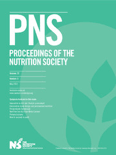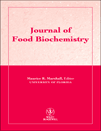
Beneficial Microbes
Scope & Guideline
Advancing Microbiological Insights for a Healthier Future
Introduction
Aims and Scopes
- Probiotics and Gut Health:
The journal extensively covers the use of probiotics in enhancing gut health, with research focusing on their mechanisms of action, efficacy, and safety in various populations. - Microbiome Research:
Exploration of the human microbiome, including its composition and functional roles, is a core focus area, highlighting its impact on health, disease, and metabolism. - Fermented Foods and Functional Ingredients:
The role of fermented foods and their bioactive components in promoting health through modulation of the gut microbiota is frequently addressed, including studies on dairy, plant-based, and novel fermented products. - Interactions with Metabolism and Immunity:
Research on how beneficial microbes influence metabolic processes and immune responses is central to the journal's scope, often linking gut microbiota to conditions such as obesity, diabetes, and inflammatory diseases. - Clinical Applications and Nutritional Interventions:
The journal also emphasizes clinical studies and nutritional interventions aimed at leveraging beneficial microbes for therapeutic purposes, particularly in managing gastrointestinal disorders and other health issues.
Trending and Emerging
- Psychobiotics and Mental Health:
There is an increasing interest in the gut-brain axis and the effects of probiotics on mental health, particularly regarding anxiety and depression, indicating a growing recognition of the psychological impact of gut microbiota. - Personalized Nutrition and Probiotic Therapy:
The trend towards personalized nutrition—tailoring dietary and probiotic interventions based on individual microbiome profiles—is gaining momentum, with several studies exploring how personalized approaches can enhance health outcomes. - Microbiota and Chronic Diseases:
Research focusing on the relationship between gut microbiota and chronic diseases, such as metabolic syndrome, autoimmune conditions, and gastrointestinal disorders, is increasingly prevalent, showcasing the importance of microbiome modulation in disease management. - Innovative Delivery Systems for Probiotics:
Emerging studies are investigating novel methods for delivering probiotics, including encapsulation techniques and the development of functional foods that enhance probiotic viability and efficacy. - Interdisciplinary Approaches to Microbiome Research:
There is a notable trend towards interdisciplinary research that combines microbiology with fields such as immunology, nutrition, and psychology, reflecting the complexity of microbial interactions with human health.
Declining or Waning
- Traditional Probiotic Strains:
There appears to be a waning interest in studies focusing solely on traditional probiotic strains like Lactobacillus and Bifidobacterium, as newer strains and combinations are being explored for their unique health benefits. - Single-Species Studies:
Research that isolates the effects of single microbial species has become less prevalent, with a shift towards multi-strain and synbiotic approaches that consider the complex interactions within the microbiome. - Animal Models in Probiotic Research:
While animal studies have been a staple in probiotic research, there is a noticeable decline in the number of publications utilizing animal models, with a growing emphasis on human clinical trials and observational studies. - Basic Mechanistic Studies:
Basic research focusing solely on the mechanistic understanding of how probiotics function at a cellular level is becoming less common, as applied research with direct health implications is prioritized.
Similar Journals

Annual Review of Phytopathology
Elevating the discourse on plant pathology.Annual Review of Phytopathology, published by ANNUAL REVIEWS, is an esteemed journal that has been at the forefront of the field since its inception in 1973. With a focus on both Plant Science and Medicine, the journal holds a prestigious Q1 ranking in both categories for 2023, reflecting its influence and significance in the academic community. The journal features comprehensive review articles that encapsulate significant advancements and emerging trends in phytopathology, providing valuable insights for researchers, professionals, and students alike. Its rigorous peer-review process ensures the highest quality of publication, making it essential for anyone seeking to stay informed on critical issues affecting plant health and related disciplines. With an impressive Scopus ranking of #10 out of 516 in Agricultural and Biological Sciences, Annual Review of Phytopathology remains a vital resource for the dissemination of cutting-edge knowledge, fostering innovation and collaboration within the field.

PROCEEDINGS OF THE NUTRITION SOCIETY
Elevating Evidence-Based Practices in Dietary SciencePROCEEDINGS OF THE NUTRITION SOCIETY, published by Cambridge University Press, stands as a leading forum for the dissemination of cutting-edge research in the fields of Nutrition and Dietetics as well as broader medical sciences. With an impressive impact factor and ranked Q1 in both its categories, the journal has established itself at the forefront of nutritional research since its inception in 1944. The journal aims to foster scientific discourse and innovation, presenting a variety of original research articles, reviews, and clinical guidelines that are invaluable to researchers, practitioners, and students alike. Although it is not an open-access publication, access options are available for institutions and individuals, ensuring a wide reach for groundbreaking studies. As a vital resource, PROCEEDINGS OF THE NUTRITION SOCIETY invites submissions that advance understanding of nutritional science, contribute to public health advancements, and promote evidence-based dietary practices.

Nutrients
Advancing nutrition science for a healthier tomorrow.Nutrients is a premier, peer-reviewed open access journal published by MDPI, dedicated to advancing the field of nutrition and dietary research. Since its inception in 2009, this journal has consistently garnered acclaim, achieving a Q1 ranking in both Food Science and Nutrition and Dietetics, reflecting its significant impact in these vital areas of study. With a robust Scopus ranking of #40 out of 389 in Food Science and #18 out of 140 in Nutrition and Dietetics, Nutrients has established itself as a leading platform for researchers, practitioners, and students aiming to share and gain insights into nutritional epidemiology, dietary interventions, and policy implications. Hailing from Basel, Switzerland, the journal ensures broader accessibility through its open access model, inviting diverse contributions that enhance our understanding of nutrition in health and disease. By fostering collaboration across disciplines, Nutrients not only serves as a resource for high-quality research but also encourages innovation essential for tackling global nutritional challenges.

JOURNAL OF FOOD SCIENCE
Elevating Standards in Food Quality and SafetyJOURNAL OF FOOD SCIENCE, published by Wiley, is a premier journal dedicated to advancing the field of food science, bridging the gap between fundamental research and practical application. With an impressive impact factor reflecting its authoritative status, the journal is ranked in the Q1 quartile for Food Science in 2023 and boasts a Scopus ranking of #71 out of 389, placing it in the 81st percentile within Agricultural and Biological Sciences. First launched in 1936, the journal continues to serve as an essential platform for researchers, professionals, and students to disseminate innovative studies and reviews that address critical issues in food quality, safety, and technology. While not currently offering open access, its rigorous peer-review process ensures the dissemination of high-quality and impactful research. Researchers engaged in the vital disciplines of food science will find this journal indispensable for keeping abreast of cutting-edge developments in the field.

Food Science and Human Wellness
Fostering Global Collaboration for Food Safety and HealthFood Science and Human Wellness, published by TSINGHUA UNIVERSITY PRESS, is an esteemed open-access journal that has been at the forefront of advancing research in the interdisciplinary fields of food science and human health since its inception in 2012. With an impressive impact factor indicative of its quality and relevance, this journal holds a prestigious Q1 ranking in Food Science according to 2023 metrics, reflecting its commitment to high-caliber research and innovation. The journal is positioned within the top 12% of its category, ranked 46th out of 389 in Agricultural and Biological Sciences. The journal not only publishes original research articles but also critical reviews, perspectives, and innovations that contribute significantly to our understanding of the relationship between nutrition, wellness, and food science. With its Open Access model, Food Science and Human Wellness ensures that its valuable content is available to a global audience, fostering collaborative advancements in this vital field. Researchers, professionals, and students are invited to explore insightful discussions and impactful studies that aim to enhance public health and food safety.

FOOD AND AGRICULTURAL IMMUNOLOGY
Enhancing Food Safety with Cutting-Edge ImmunologyFOOD AND AGRICULTURAL IMMUNOLOGY, published by Taylor & Francis Ltd, is a distinguished journal dedicated to the intersection of immunology and agricultural sciences, providing valuable insights in areas such as food safety, plant health, and disease resistance since its inception in 1989. Operating as an Open Access journal since 2017, it offers researchers and professionals unrestricted access to groundbreaking studies and reviews that advance the understanding of immunological responses in agricultural contexts. With its current quartile rankings of Q2 in Agronomy and Crop Science and Q3 in Food Science, as well as Q4 in Immunology, the journal has established itself as a vital resource for those aiming to enhance the quality and safety of food production through innovative research. By leveraging its impressive Scopus rankings across various categories, the journal promotes interdisciplinary collaboration and knowledge dissemination pertinent to both scientists and policymakers engaged in the agricultural and food sectors.

NUTRITIONAL NEUROSCIENCE
Advancing Insights: The Impact of Nutrition on Brain HealthNUTRITIONAL NEUROSCIENCE, published by Taylor & Francis Ltd, is an eminent journal in the fields of nutrition and neuroscience, dedicated to advancing our understanding of how nutritional factors influence brain function and behavior. With an impressive impact factor and ranking in the top quartiles for various related categories—including Q1 in Medicine (miscellaneous) and Q2 in both Neuroscience and Nutrition & Dietetics—this journal positions itself as a vital resource for researchers, practitioners, and students alike. Since its inception in 1998, NUTRITIONAL NEUROSCIENCE has provided a platform for high-quality peer-reviewed articles that explore the intersection of nutrition, health, and neurological sciences, aiding in the dissemination of knowledge and fostering scientific collaborations. The journal is particularly noted for its accessibility, encouraging open discussion and exploration of innovative therapeutic strategies within the scope of nutritional neuroscience.

Food Production Processing and Nutrition
Empowering scholars with breakthrough findings in food science.Food Production Processing and Nutrition, published by SpringerNature, stands at the forefront of advancing knowledge in the vibrant fields of food science, nutrition, and public health. This esteemed Open Access journal, operational since 2019, plays a pivotal role in disseminating breakthrough research that intersects food production processes with nutritional insights, making it an invaluable resource for researchers, professionals, and students alike. With a commendable 2023 impact factor reflecting its robust scholarly contributions — Q1 in Food Science and Q2 in both Nutrition and Dietetics and Public Health, Environmental and Occupational Health — the journal not only emphasizes the importance of innovative food processing methods but also addresses pressing nutritional challenges faced globally. Located in the United Kingdom, it claims an impressive Scopus ranking, with a notable percentile standing across various categorical metrics. As such, Food Production Processing and Nutrition is essential for anyone aiming to deepen their understanding of how food systems impact public health through effective processing and nutritional strategies.

JOURNAL OF FOOD BIOCHEMISTRY
Pioneering Research in Food Biochemical ProcessesJOURNAL OF FOOD BIOCHEMISTRY, published by Wiley-Hindawi in the United Kingdom, is a premier peer-reviewed journal dedicated to advancing the scientific understanding of food biochemistry. With an extensive publication history spanning from 1977 to 2024, this journal aims to bridge the gap between food science and biochemistry, making significant contributions to the understanding of food structure and composition. The journal boasts impressive Scopus rankings, placing it within the top quartile in Food Science and Q2 in Biophysics and Pharmacology, affirming its influence in the field. Notably, it provides critical insights that are vital for researchers, professionals, and students aiming to explore the biochemical processes involved in food production and safety. Despite not being open access, the journal ensures wide distribution of high-quality research, fostering collaboration and innovation within the scientific community. The impact factor reflects its relevance and quality, further solidifying its status as a key resource for cutting-edge research in food biochemistry.

Gut Microbes
Elevating the Discourse on Gut MicrobiotaGut Microbes, published by TAYLOR & FRANCIS INC, stands as a leading academic journal in the fields of Gastroenterology, Infectious Diseases, and Microbiology, with a distinguished Q1 ranking in all relevant categories for 2023. With an ISSN of 1949-0976 and an E-ISSN of 1949-0984, this journal has been at the forefront of microbiome research since its inception in 2010 and continues to provide an essential platform for the dissemination of groundbreaking studies and reviews related to gut microbiota and health. Researchers and professionals benefit from an impressive impact factor, underlining the journal's commitment to high-quality peer-reviewed articles that push the boundaries of our understanding of microbial interactions and their implications in various medical contexts. While it operates under a traditional subscription model, the journal ensures that its content remains accessible to the global scientific community through institutional access programs. As we look ahead to converging years until 2024, Gut Microbes remains a pivotal resource for those seeking to explore the intricate connections between the gut microbiome, health, and disease.